A fresh approach to soft fruit growing
12th March 2024
Tenant farmer Sandy Booth is an innovator at heart, having launched a unique fruit snack to help tackle waste – as well as taking a novel approach to vine growing in the hopes of producing the UK’s first Merlot. Sarah Kidby caught up with Sandy to hear more about the farm’s history, key challenges and unique approaches.
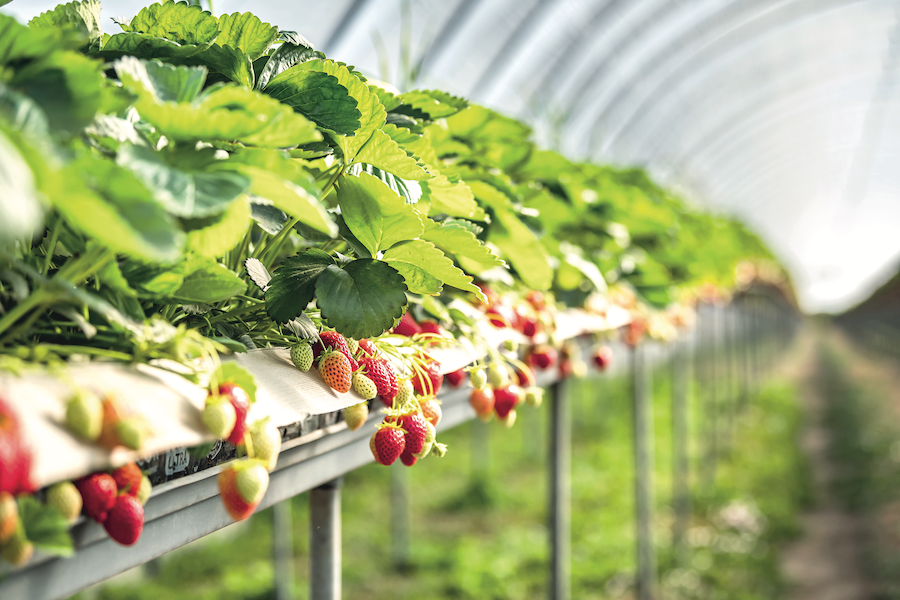
Situated in the New Forest National Park, Newhouse & Penerley Farms on the Beaulieu Estate were largely arable and dairy enterprises until they began growing around 10 tonnes of strawberries a year in the 1990s. Having worked on a number of fruit farms throughout his career, farm worker’s son, Sandy Booth, first joined the farm as a farm manager in 1997–2000, before returning eight years later as a business partner – and eventually becoming sole owner in 2017.
Today, the business grows 5,000 tonnes of strawberries a year for most of the major supermarkets, alongside raspberries, blueberries and asparagus. However, it also has a large local following, selling to local people, shops, wholesalers, hotels and restaurants. Innovation is at the heart of the business, which has experimented with growing melons, artichokes, haskaps, nectarines and peaches.
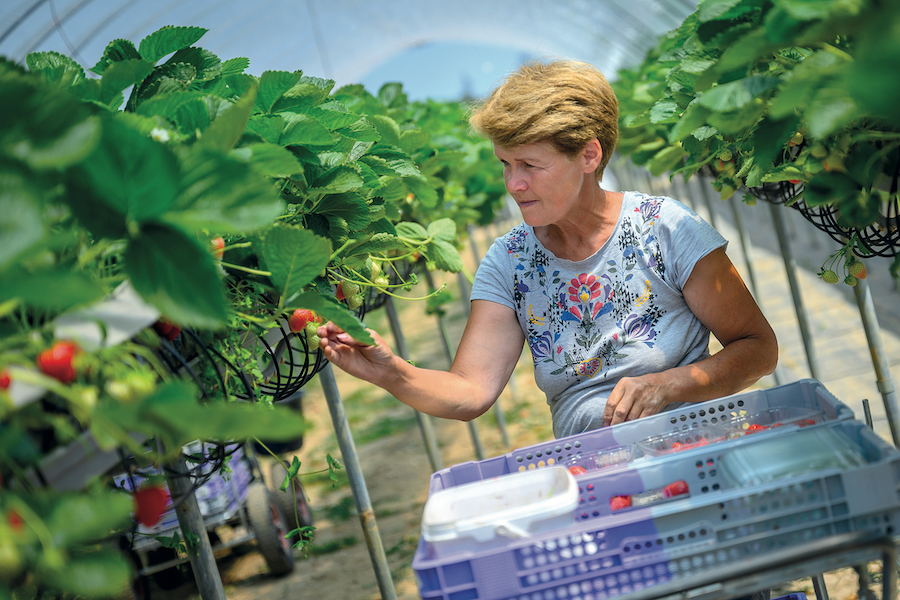
Operating under the New Forest Fruit Co (NFFC) name, it grows around 12 main strawberry varieties and 50 new varieties each year, which are a mix of Junebearers, harvested over an eight-week period, and everbearers, which usually last from May till the end of October. Finding new varieties is a continual challenge – out of the 50 they try each year, they are lucky if they find one or two they want to bring back the following year.
When selecting new varieties, there are a range of factors that have to be considered; but flavour is the top priority, alongside shelf life, colour and texture, Sandy explained. NFFC’s main line-up includes British-bred variety and Junebearer Malling Centenary, plus Murano and Favori. Meanwhile, Ania is grown for the premium market and offers a different taste and a more unusual product. The variety has its challenges – it is not as high yielding as other varieties, and has a bigger gap between flushes of fruit – but it gives the farm a point of difference from other growers and allows them to charge a premium.
Farming with nature
Economics dictates that strawberries are replanted each year, as pest and disease pressures mean it is better to start with a new plant. Botrytis is less of an issue for the farm, while powdery mildew is the main threat. Robots applying UV-C light to strawberry plants as an alternative to sprays proved particularly successful in one variety in 2023 – so the trial will be expanded from 1ha to 30ha this year.
When it comes to pests, thrips and spider mite are kept in check with biological controls, and the farm also plants garlic as an aphid deterrent to help reduce its insecticide use.
Farming in tandem with nature is at the centre of the NFFC’s practices. Two beekeepers keep honeybees on site, but they also buy in bumblebees – it’s important to use a combination to ensure everything is pollinated in time for early spring. Sandy describes honeybees as being “like teenagers” – they don’t start working until about 11am and stop at 2pm, whereas bumblebees can work at 5ºC and are active from 9am–3pm.
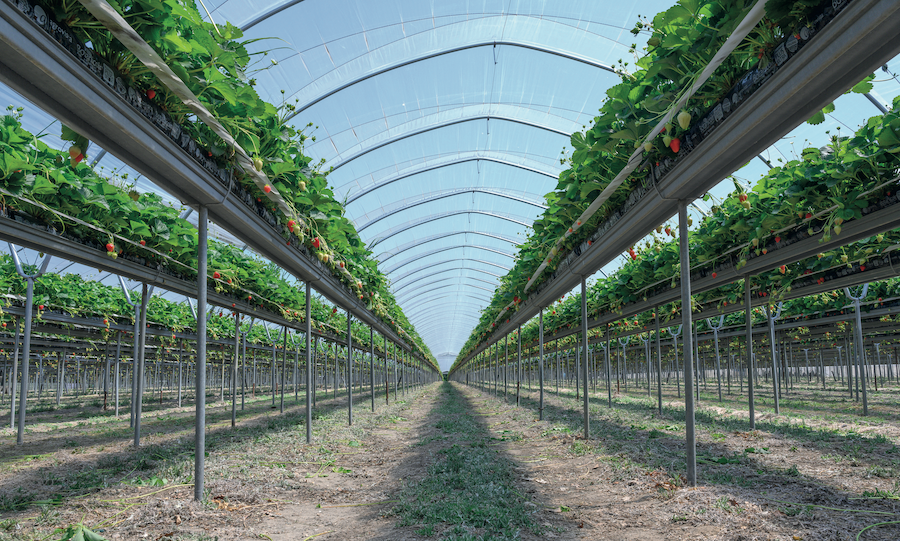
The farm, which is a LEAF demonstration farm, also has lots of hedgerows providing habitat for a variety of species, as well as wildlife corridors to link them up and designated conservation areas. Unused land around the site’s reservoirs has been planted with fruit trees to encourage more wildlife, and as part of a biodiversity project. An extra 400m of hedging was laid last year using traditional methods. More is on-track to be laid in 2024.
Key challenges
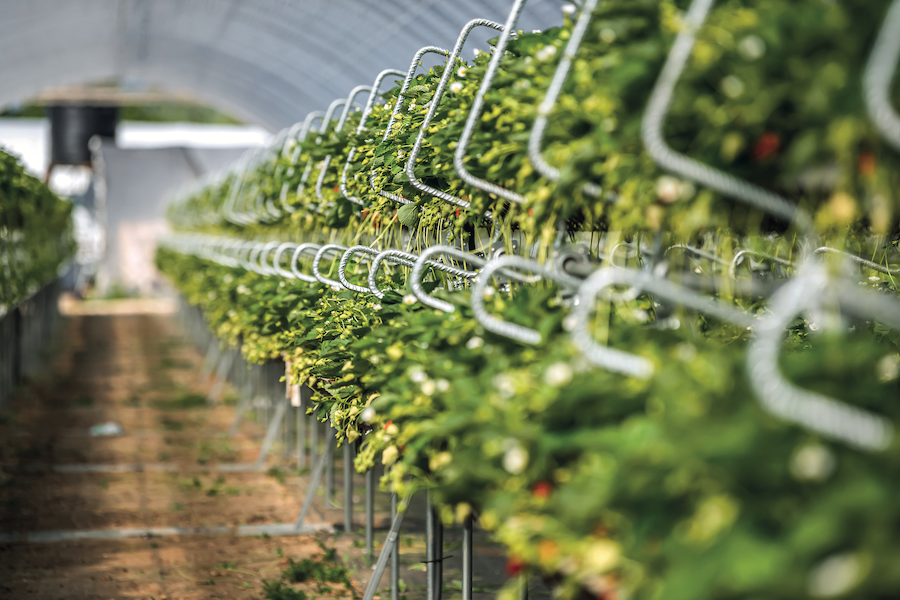
With the increase in unpredictable weather, water availability is a growing challenge, so the NFFC built two 45,000m3 reservoirs in 2020 and 2021 – plus a new tunnel system that harvests the rainwater which is directed back to the reservoirs.
Labour has also been an issue for many farms in recent years, and Sandy stressed the importance of workers being able to come to the UK for work and to contribute to the economy. Around 500 people work on the farm at any given time, and the workload continues more or less year-round – with work wrapping up for a month over Christmas, ready for replanting in January and the start of asparagus picking at the end of February. Labour is sourced from Fruitful Jobs UK, and many workers return year after year.
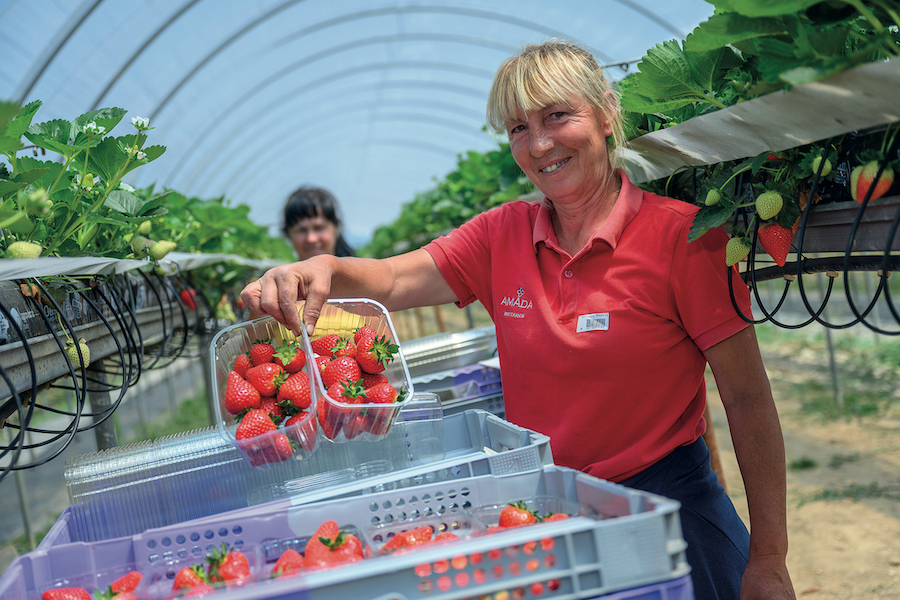
Robots are also being trialled for strawberry picking, but it’s a slow process and, although Sandy believes there is a future for them in picking, pest and disease control and even yield forecasting, they will not be able to completely replace human workers.
Also, delays waiting for new machinery has become another issue for the NFFC – a new forklift that arrived in 2023, for example, had to be ordered a year in advance – which is why they try to keep machinery as up to date as possible to avoid long wait times for new parts.
Unique dried fruits
Previously, the farm sent its waste fruit to a company in Scotland where it was used for making jams and purées, but around four years ago Sandy decided to try using it for healthy snacks. After jumping through many hoops and suffering delays due to the Covid-19 pandemic, the Booths recently launched their range of unique pulse dried strawberries.
Explaining how the process works, Sandy said: “Basically we put a hole into every cell within the fruit so we can extract all the water out of it. Normally when you freeze-dry something the fruit shrinks; but when you do PDF (pulse dried fruit), it stays the same size. We are also helping to trap in more nutrition, so it is as good as eating a fresh strawberry.”
Another unique aspect to the snack is that when you drop it back into any liquid, e.g., water, Prosecco or a gin and tonic, the fruit will reabsorb the water in 10 seconds, and it becomes a fresh strawberry again.
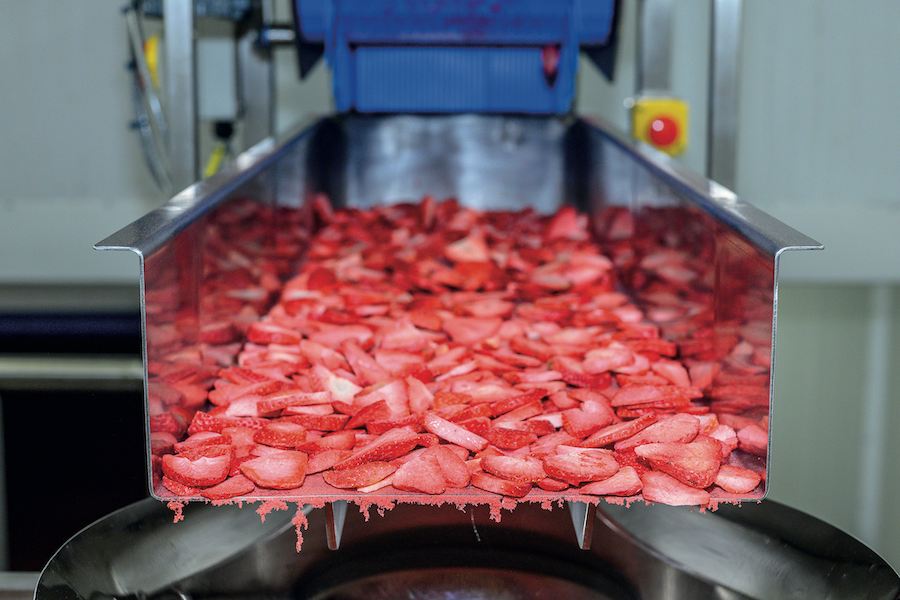
Furthermore, the fruit is entirely British-grown, compared to freeze-dried products which are often imported from Morocco, Spain or China, for example. Such products often add ingredients like sunflower oil or apple juice for flavour and to stop the fruit sticking together – but the NFFC snacks are pure strawberry, Sandy added.
Having invested in all the necessary equipment, the farm is able to pulse dry and package the fruit on site. It is one of only three companies in the UK that are using the pulse machine, and the only one using it for fruit. The downside of being a unique product is that they had no knowledge base to draw from, which has created challenges. But the strawberry snacks are now being sold in local stores, with hopes for big contracts in 2024. With the dried fruit’s lightweight nature, nutritional properties and ability to easily rehydrate, it has attracted a lot of interest.
The technique could be used on any fruit – the company has tried it successfully on pineapple – and there are plans to expand to farm-grown raspberries in mid-2024 and blueberries towards the end of the year.
NFFC has also worked with Parkside to produce 100% biodegradable packaging, which is unique to the industry – it is home compostable within 26 weeks.
A novel approach to vine growing
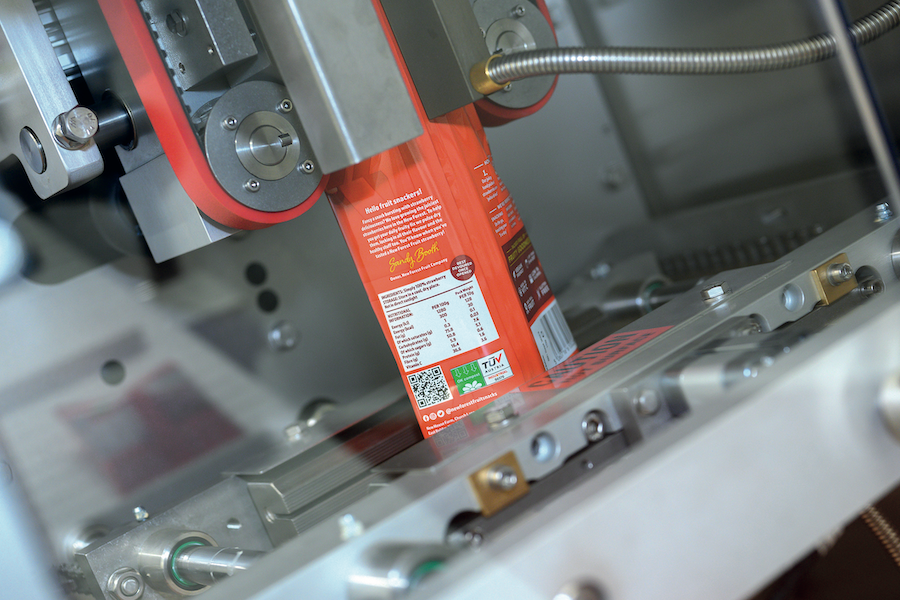
Alongside the fruit growing business, Sandy started looking after the Beaulieu Estate vineyard in 2019. As the old vineyard hadn’t been very successful, he decided to plant new vines on the other half of the field in 2021. With an innovator’s head, Sandy wanted to make some of the wines he likes to drink, such as Merlot, Shiraz, Tempranillo or Gewürztraminer, which are ill-suited to the English climate.
Having been told the varieties wouldn’t work in this country, Sandy said: “I went and planted them in tunnels anyway”.
Two years on, they picked their first harvest of Gewürztraminer, Merlot and Shiraz, as well as Cabernet Franc, Cabernet Jura and Pinotin. Also in the nursery this year were Tempranillo and Grenache, and Sandy hopes to bring in Nebbiolo next year.
Sandy said they are not having to spray the vines for downy mildew and are achieving brix levels that are “beyond expectation compared to what people are getting outside only”. It’s expected they will be able to sell the white grapes next year, and the red grapes will follow depending on how successful they are.
“There are a lot of sceptics out there saying that this is not the way to grow grapes, but in the environment that we are in these days where you can’t tell what the weather’s going to do, it makes sense. I think it’s about making things as sustainable as possible, because especially this year, I’ve heard of growers spraying two or three times a week just to keep mildew away,” Sandy said.
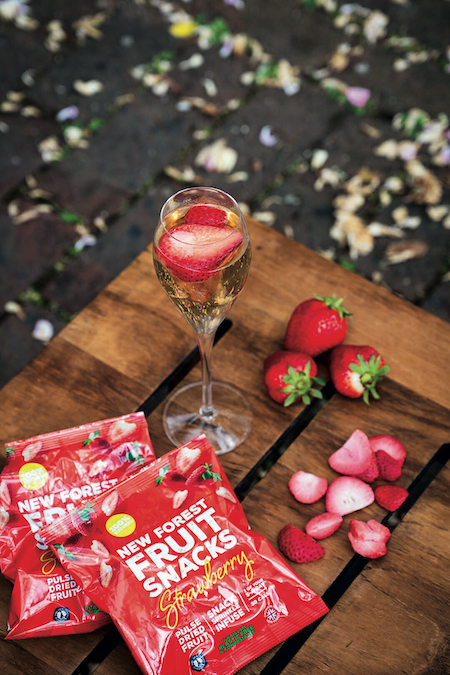
“Our advisor was telling us to spray every two weeks; however, we were lucky and only needed to do it once a month.”
Sandy’s novel approach to vine growing was borrowed from the success of growing asparagus in French tunnels, using waste coir. After much experimentation, they built the first tabletop asparagus system in the UK in 2018, filled with an 80cm ‘buffer zone’ of coir, reused from strawberry production – whilst still allowing the roots of the asparagus to go into the soil. This method allows them to harvest around two months earlier than usual and also helps to balance the bacteria and fungi levels, whilst delivering better flavour and texture. As a result, they use only nutritional sprays, and no chemical spraying on their asparagus.
Sandy applied a similar tactic to growing his unusual vine varieties. Vines are planted in 12-litre pots in a nursery inside a tunnel for the first year, before being planted in the tabletop system in the field – with a 50x50cm buffer zone of coir. It allows them to skip a couple of years of growing, Sandy said.
“A lot of people would see the disadvantages, but we invited a Growers’ Group and they were all blown away. They couldn’t believe how good the crop looked considering we hadn’t sprayed it at all.”
Once it’s available, hopefully in a year’s time, the resulting wine will be sold under the label Beaulieu 58, as a nod to the vineyard’s location and origins in 1958. When the Gewürztraminer grapes were harvested, they had a brix reading of 22, which translates to an alcohol level of about 12%, and are being finished in an oak barrel. The wine was fermented and bottled at another location; however, Sandy hopes to bring this in-house in the future.
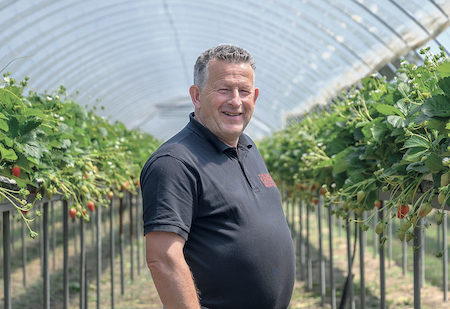
Grower profile
- Farm manager: Sandy Booth
- Location: Hampshire
- Total farm size: 80ha
- Soft fruits grown: Strawberries, raspberries and blueberries. Twelve main strawberry varieties, plus 50 new varieties are trialled each year
- Soil type: Clay loam
Read more featured profiles
Read more fruit news
